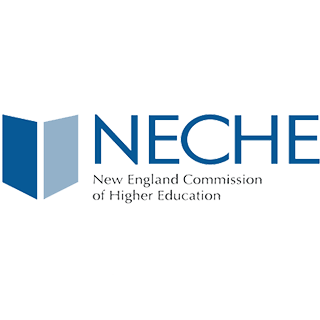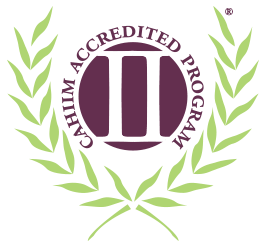The Importance of Health Education
Health | 10min Read

Learn the technology, terminology and professional skills required for a career in health information management with Southern New Hampshire University's Bachelor of Science (BS) in Health Information Management (HIM) degree online.
The bachelor's in health information management program is accredited by the Commission on Accreditation for Health Informatics and Information Management Education (CAHIIM).

Build your skill set and gain valuable professional practice through structured field experience in the health information management bachelor's program at Southern New Hampshire University (SNHU). Through technology, health science and business courses, you'll learn essential aspects of managing data in today’s complex healthcare landscape.
In addition to helping you develop practical skills and experiences employers want to see, the program also meets eligibility requirements to sit for the Registered Health Information Administrator (RHIA) credential exam – which can help position you for even more opportunities.
Learn the technology, terminology and professional skills required for a career in health information management through major courses and experiential learning.
Visit the course catalog to view the full BS in Health Information Management curriculum.
All undergraduate students are required to take general education courses, which are part of SNHU's newly redesigned program, The Commons. The goal of The Commons' curriculum is to empower you with some of the most in-demand skills, so you can succeed not only in your academic career, but in your personal and professional life too.
| Component Type | PC (Windows OS) |
|---|---|
| Operating System | Currently supported operating system from Microsoft. |
| Memory (RAM) | 8GB or higher |
| Hard Drive | 100GB or higher |
| Antivirus Software | Required for campus students. Strongly recommended for online students. |
| SNHU Purchase Programs | Visit Dell |
| Internet/ Bandwidth | 5 Mbps Download, 1 Mbps Upload and less than 100ms Latency |
| Component Type | Apple (Mac OS) |
|---|---|
| Operating System | Currently supported operating system from Apple. |
| Memory (RAM) | 8GB or higher |
| Hard Drive | 100GB or higher |
| Antivirus Software | Required for campus students. Strongly recommended for online students. |
| SNHU Purchase Programs | Visit Apple |
| Internet/ Bandwidth | 5 Mbps Download, 1 Mbps Upload and less than 100ms Latency |
Additional Information:
SNHU has provided additional information for programs that educationally prepare students for professional licensure or certification. Learn more about what that means for your program on our licensure and certification disclosure page.
There's no better way to put your skills and knowledge to the test than in a real-world setting. That's why the online health information management degree program includes an experiential learning opportunity known as professional practice experience (PPE).
You can choose from a variety of organizations that collect and manage patient health data to complete your PPE (including, but not limited to): acute, ambulatory, behavioral health, chiropractic medicine, dental medicine, home health, hospice and veterinary medicine.
Through your PPE, you'll receive valuable firsthand experience and mentorship in a healthcare setting, helping position you for success in a competitive field.
At SNHU, you can get credit for having your Certified Coding Specialist (CCS) or Certified Coding Specialist – Physician-based (CCS-P) certification from AHIMA.
The credits you earn could save you up to $960 in tuition and 8 weeks of time on your HIM bachelor's program. Learn more about getting credit for HIM certifications.
Our no-commitment application can help you decide if SNHU is the right college for you and your career goals. Apply up until 2 days before the term starts!
Upcoming term starts: June 30, 2025 | September 1, 2025
Attending college online at SNHU can be a life-changing experience. In fact, 93.2% of online students would recommend SNHU according to a 2023 survey with 21,000+ respondents.
You’ll take your courses within SNHU’s Brightspace platform. This is where you’ll find your:

Our faculty come to SNHU with years of experience — and many of them have been exactly where you are now. Bringing their firsthand perspectives to the classroom, your instructors will share professional insights that support your growth in the field of health information management.
 Dr. Lynn Ward
Dr. Lynn WardDr. Lynn Ward joined SNHU with decades of higher education experience and a multifaceted background in health information management. Beyond her role as an associate dean, Ward is a certified online instructor, registered health information administrator and certified professional in healthcare information and management systems. She has presented for the Healthcare Information and Management Systems Society (HIMSS) and American Health Information Management Association (AHIMA).
Position
Associate Dean of Health Professions
Joined SNHU
2016
Education
"HIM is constantly changing, so there are always knew things to learn."
What our instructors have to say

"SNHU’s BS in Health Information Management program is CAHIIM accredited, meaning it meets a standard of excellence. It’s a very dynamic program. We strive to provide the students with the best experience to nurture professional growth.”
Catina Flagg, clinical faculty of health professions
At Southern New Hampshire University, you'll have access to a powerful network of more than 400,000 students, alumni and staff that can help support you long after graduation. Our instructors offer relevant, real-world expertise to help you understand and navigate the field. Plus, with our growing, nationwide alumni network, you'll have the potential to tap into a number of internship and career opportunities.
Recently, SNHU has been nationally recognized for leading the way toward more innovative, affordable and achievable education:
Founded in 1932, Southern New Hampshire University is a private, nonprofit institution with over 180,000 graduates across the country. SNHU is accredited by the regional accreditor New England Commission of Higher Education (NECHE), which advocates for institutional improvement and public assurance of quality.
No application fee. No test scores. And no college essay. Just a simple form with basic information. It’s another way SNHU helps you reach your goals sooner.
It's easy, fast and free.
Whether you're applying for an undergraduate or graduate degree, you’ll fill out a form to verify your previous education experience. As part of our admissions process, we'll help you request transcripts from your previous school(s) to see if you can transfer any credits into your SNHU program! (Also for free!)
After reviewing your official evaluation, you can decide if SNHU is right for you! If you choose to enroll, just pick your start date and get ready for classes to begin.
Talk to an admission counselor: 888.327.SNHU | enroll@snhu.edu
SNHU is accredited by the regional accreditor the New England Commission of Higher Education (NECHE). The university also carries specialized accreditations for some programs.
The Health Information Management accreditor of Southern New Hampshire University is the Commission on Accreditation for Health Informatics and Information Management Education (CAHIIM). The university’s accreditation for the Baccalaureate degree in Health Information Management has been reaffirmed through 2029. All inquiries about the program’s accreditation status should be directed by mail to CAHIIM, 200 East Randolph St., Suite 5100, Chicago, IL 60601; by phone at 312.235.3255; or by email at info@cahiim.org.


CAHIIM requires accredited programs to provide achievement data which is reported below:
Enrollment: 1,459
Total number of full and part-time BS in Health Information Management students enrolled in at least one course during the August 1, 2022-July 31, 2023 timeframe.
Student Satisfaction Rate: 91.8%
The percentage of full and part-time BS in Health Information Management students who responded to the 2023 student satisfaction survey and indicated they are satisfied with their overall educational experience. Out of 1173 students surveyed, 134 responded.
Graduation Rate: 23.1%
The percentage of full and part-time BS in Health Information Management students (first year and transfer) who graduated within 6 years of starting their program. This percentage is based on a cohort of 234 students that reached the 6-year mark between August 1, 2022 and July 31, 2023.
Employment Rate: 60%
The percentage of BS in Health Information Management graduates who responded to the 6 months post-graduation survey and indicated they were employed. Out of 136 students who graduated between July 2022-June 2023, 11 responded to the survey and provided employment information. Ten responded that they were employed or seeking employment; one indicated they were not seeking employment.
As a nonprofit university, SNHU offers some of the lowest online tuition rates in the country. And when you work with our Financial Services team, we'll explore ways to help you save even more on your education – and customize a payment plan that works for you.
*before previously earned credits are applied
Tuition rates are subject to change and are reviewed annually.
**Note: Students receiving this rate are not eligible for additional discounts.
Additional costs: Course materials vary by course.
If 30 of your prior learning credits ($330/credit) are accepted toward your bachelor’s degree.
Your remaining tuition cost: $29,700
If 45 of your prior learning credits ($330/credit) are accepted toward your bachelor’s degree.
Your remaining tuition cost: $24,750
If 60 of your prior learning credits ($330/credit) are accepted toward your bachelor’s degree.
Your remaining tuition cost: $19,800
If 75 of your prior learning credits ($330/credit) are accepted toward your bachelor’s degree.
Your remaining tuition cost: $14,850
If 90 of your prior learning credits ($330/credit) are accepted toward your bachelor’s degree.
Your remaining tuition cost: $9,900
How we estimate your tuition cost:
We look at the cost per credit multiplied by the number of credits you need to earn for a bachelor's degree. Most bachelor's degrees require 120 credits. SNHU allows you to transfer in up to 90 credits, requiring a minimum of 30 credits to be taken at SNHU. This is only a tuition estimator, and doesn't account for other fees that may be associated with your program of choice.
Transfer up to 90 credits toward your bachelor's degree program at SNHU. If you’ve taken one course or many, we’ll evaluate them for you.
Fill out the FAFSA to see if you’re eligible for grants or work-study. (You could also be offered loans, though you’ll have to pay those back later.)
Earn credits in leadership, technology and more – while taking advantage of a 30% online undergraduate tuition discount for active-duty service members and spouses.
Getting free money for college – from SNHU or an outside organization – could help you save hundreds or even thousands of dollars.
Bring in credits from popular options like CLEP, Sophia Learning, Google and other common credit for prior learning (CPL) experiences.
Learn how you can save money with tuition reimbursement from your employer.
Receive an online tuition discount if your organization has partnered with SNHU for educational benefits. See if your organization partners with us.
Health practitioners are increasingly using patient data to inform better treatment plans and improve patient outcomes, accelerating job growth for years to come. And with recent federal regulations requiring healthcare organizations go digital – utilizing and securing electronic health records – there's an increased demand for skilled health information managers.
In addition to helping you develop practical skills and experiences employers want to see, the program also meets eligibility requirements to sit for the Registered Health Information Administrator (RHIA) credential exam – which can help you open up even more opportunities for advancement.
With a bachelor's in health information management, you'll be prepared to work in a variety of health-related careers. Here are a few ideas:
Work closely with data and image storage systems to collect information analyze data, build interfaces, and troubleshoot software and more.
Create or organize systems to store different health information and data, in addition to ensuring databases are secure and function optimally.
Help ensure software systems meet the desired outcome of your organization by customizing software, managing installation, and training employees on use and best practices.
Work to create solutions to health problems based on research and data, and help to improve the general public health monitoring and measuring outcomes.
Organize and manage data sets, analyze healthcare data, and communicate recommendations for optimization and improvement with data visualization and reports.
Assist team members in completing complex clinical research trials. Oversee data collection, reporting and entry into data management systems.
Increase in roles for medical and health services managers through 2032, according to the U.S. Bureau of Labor Statistics (BLS).1
Median annual pay for medical and health services managers as of May 2023, according to the BLS.1
Understanding the numbers
When reviewing job growth and salary information, it’s important to remember that actual numbers can vary due to many different factors—like years of experience in the role, industry of employment, geographic location, worker skill and economic conditions. Cited projections are based on Bureau of Labor Statistics data, not on SNHU graduate outcomes, and do not guarantee actual salary or job growth.

I'm amazed how everyone at SNHU has the same spirit. It's unreal how everyone is so nice, and amazing and really is on board with helping us achieve the accomplishments we set out. It's unmatched.
This specialized healthcare degree prepares students for a career in health information management (HIM), often described as the intersection of business, technology and health. Bachelor’s programs in HIM focus on the management of electronic health records and foster creative problem-solving using innovative technology and the guiding principles of managing patient health data.
HIM degree candidates learn to lead initiatives involving electronic health records, including accuracy, completion, security and governance. Such initiatives are critical to the healthcare system, since the accuracy of an electronic health record is reflected in billing, which impacts reimbursement and, in turn, affects healthcare costs for all stakeholders. Information contained in electronic health records is also used to track health trends to ensure proper treatment and coordinated care for both the individual and populations at large.
Graduates of the program can then enter the workforce with a unique combination of technical expertise and critical soft skills.

In addition to coursework that emphasizes specialized training and patient-centered care, Southern New Hampshire University’s (SNHU) online bachelor's in HIM exposes students to a professional practice experience. Students learn the technology, terminology and professional skills required for a career in HIM and receive valuable exposure to a professional healthcare setting.
SNHU's HIM degree is accredited by the Commission on Accreditation for Health Informatics and Information Management (CAHIIM), the seal of approval for high-caliber HIM academic programs. It also provides the educational requirements to sit for the Registered Health Information Administrator (RHIA) exam, a nationally recognized certification in the field.
According to AHIMA, those who pass the RHIA exam:
"At SNHU, we prepare our students to sit for the RHIA credential,” said Catina Flagg, clinical faculty of health professions. “It’s a critical link between care providers, payers and patients. Holding the RHIA credential tells employers that you are a content expert in your field."
According to the American Health Information Management Association (AHIMA), earning a bachelor’s or master’s in health information management (HIM) can lead to a long-lasting career in one of the nation’s fastest-growing industries.4 HIM students gain clinical, information technology (IT), leadership and management skills. In the professional arena, they’ll use those skills to serve as a bridge between clinicians, administrators, technology designers and IT professionals.
Cheryl Martin, AHIMA’s health information management strategic advisor, calls HIM a “hidden jewel of job opportunities.” She says health information management professionals need a unique combination of industry expertise, people skills and analytical skills.
Martin points out the ability to pull meaning from data can impact not only health outcomes, but a hospital’s balance sheet. She says employers look for people who can make data “available for those who need access but protected from those who don’t.” A HIM degree provides the foundation to develop that prized skill set.
With its emphasis on the human interaction that weaves through data, the curriculum tends to forge strong bonds between students and educators, said Martin. Students learn early on that they need to uphold the profession’s high standards and often turn to educators for counsel long after they graduate as a result.
A HIM degree could also provide a perfect pathway for someone already in a health science field to advance their career.
"I have over a decade of direct patient and clinical workflow experience," said John Mann '21. "I have worked during most of the HIM program with subjects like HIPAA, Meaningful Use Stages and CMS moving from a volume care to value care models. This degree seemed to be the right next step in combining my body of experience with the direction I’d like to take my career."
Beyond the practical knowledge you'll gain, a HIM degree from Southern New Hampshire University (SNHU) comes with an extra level of support along the way.
"I feel that my experience attending SNHU was better than any of earlier experiences in a traditional college setting," Mann said. "One huge reason for this was that my advisor was a constant support. When I attended college in the traditional setting, I felt like I was just another number in the student body. My SNHU advisor was a huge asset, and I have so much gratitude that she supported me through my journey."
Overall, Melissa Smith '21 says the program exceeded her expectations.
"The HIM degree program went above and beyond what I was expecting to learn, the real-life experiences truly open your eyes and show you what you can expect to see and how it will all play together in the overall success of your career," she said. "You truly have the freedom and abilities to complete all your work at your own pace and still feel challenged by the education."
Classes in health information management (HIM) include medical terminology, coding and classification systems, ethics and legal considerations, and pathophysiology and pharmacology concepts. Students may also need to take general education courses depending on how many transfer credits they can apply to their program.
It's worth noting that, with Southern New Hampshire University's (SNHU) generous transfer policy (up to 90 credits for bachelor's degree programs), you may already have the credits you need to satisfy some of your courses. This could mean earning your degree much faster than you think.
"Unlike some other institutions, SNHU doesn’t waste students’ time and really gives you credit for everything in your academic history," said John Mann '21. "In fact, for me, my years worked in healthcare counted as some elective credits. I transferred in and only had to take 2 electives outside of my core HIM requirements."
While both disciplines involve a blend of business and healthcare, health information management (HIM) and healthcare administration are two very different fields. HIM mostly focuses on the competencies needed to manage electronic health records. The role primarily affects internal stakeholders needing access to data, but it can also directly affect patients.
Healthcare administration, on the other hand, centers around organizational management and encompasses everything from quality improvement to marketing, strategy and human resource management.
According to the U.S. Bureau of Labor Statistics (BLS), medical and health service managers earned a median salary of $110,680 in 2023.1 The BLS projects the field could grow 28% through 2032.1
The American Health Information Management Association (AHIMA) notes the growing prevalence of health information technology (HIT) makes health information one of the most critical components of the electronic health record (EHR) workforce.4
According to the American Health Information Management Association (AHIMA), health information management (HIM) professionals affect the quality of patient information and patient care at every touchpoint in the healthcare delivery cycle.3 They help classify diseases and treatments to ensure standardization for clinical, financial and legal uses within the healthcare industry. And they’re responsible for the quality, integrity and protection of a patient’s health information, including patient histories, lab results and radiology procedures.
As a professional in HIM, your work can help save lives. Take, for example, a young father of 3 who comes into the ER at 2 am, panicked because 1 of his children is suffering from shortness of breath. This particular child has a history of medical issues, including a 3-week stay in a neonatal intensive care unit (NICU). However, reeling with exhaustion and stress, the father misses key details regarding past treatment.
In this case – when a parent or patient is understandably overwhelmed – accessible, accurate medical records give the nurse what they need to deliver care. Without a HIM professional behind the scenes, that wouldn't be possible.

“It’s my dream job – working in the oncology field, being able to give back to fellow survivors in some small way and working from home (with my cats!),” Sullivan said. “Attending SNHU was the best decision I ever made.”
Now, she urges professionals, like herself, to make their move. “Do it now,” she said. “I hesitated too, thinking I’ll be almost 50 when I graduate. But then I realized that I'll be almost 50 anyway – might as well have a degree to show for it.”
To accomplish quality care, a HIM professional will need to:
Beyond technical capabilities, a HIM degree can help you build skills you need to navigate a fast-paced healthcare environment. "[You'll be working in] a place where human interaction is extremely important — the ability to deal with change, handle conflict, the ability to listen, actually excelling in all forms of communication," said Cheryl Martin, AHIMA’s HIM strategic advisor.
AHIMA cites academic institutions, consulting agencies, government agencies and healthcare software companies as the types of employers with an increased demand for educated HIM practitioners.
As the profession continues to grow, so do HIM career opportunities. Here’s a partial listing of the job roles on the AHIMA website:
According to the American Medical Informatics Association (AMIA), healthcare informatics is a multidisciplinary and integrative field focused on health information technologies (HIT) that involves the computer, cognitive and social sciences. Healthcare informatics applies principles of computer and information science to the advancement of life sciences research, health professions education, public health and patient care.4
Health information technicians (or health informaticists) use data, information and knowledge to improve human health and the delivery of healthcare services. An integral part of any healthcare team, they help incorporate advanced technology into patient care and facility operations, reducing errors and maximizing efficiencies. As technology continues to evolve, the healthcare industry will need trained professionals to help implement these changes.
1Bureau of Labor Statistics, U.S. Department of Labor, Occupational Outlook Handbook, on the internet, at https://www.bls.gov/ooh/management/medical-and-health-services-managers.htm (viewed April 19, 2024).
Cited projections may not reflect local and/or short-term economic or job conditions and do not guarantee actual job growth.
2American Health Information Management Association, US Salary Report: HIM Professionals in 2019, on the internet, at https://www.ahima.org/media/d5ibycdp/salary-survey-report.pdf (viewed April 19, 2024).
3American Health Information Management Association, on the internet, at http://www.ahima.org/careers/healthinfo?tabid=what (viewed April 19, 2024).
4American Medical Informatics Association, on the internet, at https://www.amia.org/fact-sheets/what-informatics (viewed April 19, 2024).